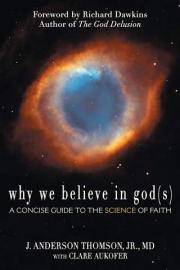 by Matthew Cullinan Hoffman –
by Matthew Cullinan Hoffman –
The ranks of celebrity atheists lionized by the major media is now being joined by a psychiatrist and journalist who have jointly written the book “Why We Believe in God(s): A Concise Guide to the Science of Faith.” The two authors claim, in short, that God is nothing more than a figment of our biologically-determined imaginations.
In a recent article about the book, J. Anderson Thomson, a University of Virginia psychiatrist, and “medical writer” Clare Aukofer repeat stale clichés from the repertoire of 19th century German atheism, dressed up as modern “science.” They begin by citing the inane lyrics of John Lennon’s “Imagine,” in which he claims that the socialist paradise he envisions will bring “peace” with “no heaven…no hell below us…and no religion too.”
“No religion,” the authors rhapsodize. “What was Lennon summoning? For starters, a world without ‘divine’ messengers, like Osama bin Laden, sparking violence. A world where mistakes, like the avoidable loss of life in Hurricane Katrina, would be rectified rather than chalked up to ‘God’s will.’ Where politicians no longer compete to prove who believes more strongly in the irrational and untenable. Where critical thinking is an ideal. In short, a world that makes sense.”
How we make “sense” out of a world that is nothing more than the blind churnings of matter, without any ultimate purpose, is beyond me, and is unsurprisingly not addressed by the authors. But surely this duo could come up with more than the jaded accusations of “violence” always leveled against religion by atheists, who always seem to forget that the cruelest and most violent regimes in history, such as Mao’s China and Stalin’s Russia, were inspired by and led by atheists.
China’s atheist regime continues to impose mass murder on its people through its coercive “one child policy,” which has now resulted in hundreds of millions of deaths by abortion. But who’s counting? Certainly not atheists, who are unlikely to even acknowledge the humanity of the unborn.
If human beings are nothing more than a configuration of atoms with no ultimate purpose, the concepts of right and wrong are rendered meaningless.
Those who defend theism in a generic sense do not claim that it is a sufficient condition for virtue. The great world religions are not always conduits of truth, and the errors that mar some of them have caused real suffering for humanity. But denying the existence of God, which is the only conceivable basis for an objective morality, is hardly the answer. If human beings are nothing more than a configuration of atoms with no ultimate purpose, the concepts of right and wrong are rendered meaningless. Surely even a psychiatrist can see that, and perhaps even a reporter.
Do the authors expect us to forget that religion has produced much, if not most, of the greatest art and architecture enjoyed by mankind, as well as the modern educational system? Do they think that a cheap crack about Osama Bin Laden will serve to dismiss the vast charitable works, from hospitals and homeless shelters to massive international aid agencies, that have been inspired by religious belief? Surely Thompson and Aukofer can do more than pass over these towering facts in silence, as if ignoring them will make them go away.
The authors then pull the old trick of 19th century German atheists like Feuerbach, Marx, Nietzcsche, and Freud, who never made any attempt to answer the historic arguments for the existence of God, and instead threw out the red herring of psychological, economic, and biological explanations for religion. The assumption is that if you can explain the origins of a belief, you have somehow refuted it, a silly non-sequitur that only serves to remind us of the impotency of the atheist’s position.
Thompson and Aukofer take the biological route, claiming that we are genetically hard-wired to believe in God because it served our ancestors as a survival mechanism.
If religion can be explained by our genes, would the same not be true of atheism?
“Like our physiological DNA, the psychological mechanisms behind faith evolved over the eons through natural selection,” they claim. “They helped our ancestors work effectively in small groups and survive and reproduce, traits developed long before recorded history, from foundations deep in our mammalian, primate and African hunter-gatherer past.”
The authors drone on like this from one paragraph to the next, citing speculative evolutionary pathways to theism that they say have been offered by researchers. They sprinkle their commentary with silly observations about man’s need for social “attachment,” “reciprocity,” “romantic love,” and “group hatreds,” as if a few trite references to psychological phenomena can explain away man’s almost universal belief in the divine.
The questions they leave begging, however, speak more about their own psychology than anything else. If evolutionary biology explains man’s belief in God, how do we explain the authors’ atheism? Do they claim to be supermen who, unlike the rest of us, can transcend their own natures? If religion can be explained by our genes, would the same not be true of atheism? What’s good for the goose is good for the gander.
Reducing man’s ideas to his biology, in fact, destroys the foundation of all knowledge.
Reducing man’s ideas to his biology, in fact, destroys the foundation of all knowledge. If our ideas are determined by our genes, then how can we know if anything we believe is true? Such refutations were long ago leveled against the muddled thinking of materialists, but the authors, confused by the crude empiricist errors of modern scientism, apparently are unaware of the historic debate. Ignorance of the history of ideas is a woefully common trait among atheists.
The LA Times piece is just the latest reminder of the effect of atheism on an otherwise able mind. The fact that the authors of the article have written an entire book elaborating on their evolutionary thesis on the origin of religion, apparently totally unaware of the simple fallacies that underlie their premise, does little more than illustrate a truth that has been demonstrated time and again by the modern partisans of disbelief: the irrationality of atheism undermines one’s ability to think.
HT: LifeSiteNews



